Encouraging policies that promote successful re-entry and reduce recidivism
Reintegration policies should be guided by an emphasis on reducing recidivism and community rebuilding following a period of incarceration. Barriers to successful reintegration include laws that serve to further punish released individuals and reduce their civic engagement. Everyone should be granted the privileges of full citizenship, and formerly incarcerated individuals should be provided with the tools to not only reintegrate into their communities but build their communities up.
State, local and federal governments should adopt policies that do the following:
- Expand the Second Chance Act of 2008, which intends to promote successful reintegration following incarceration;
- Repeal post-conviction consequences that hamper successful re-entry, including barriers to voting, employment, jury participation, and social services;
- Institute graduated re-entry and vocational programs, which provide structured transitional services to individuals within a year of release, such as the Montgomery Pre-Release Center that focuses on securing a job prior to release;
- Require that reentry programs be competent in providing support to LGBTQ individuals;
- Remove barriers to federal housing subsidies for formerly incarcerated individuals;
- Prohibit the use of criminal background checks that are not specifically-related to the job, or employment license, for employment purposes;
- “Reduce the potential tort liabilities to employers for negligent hiring suits. Reduced tort liability will make employers more likely to hire parolees. Statistics show that parolees with good, steady jobs are less likely to reoffend;”
- Prohibit the use of criminal background checks on housing applications;
- Establish incarceration and post-incarceration programs specifically devoted to educating incarcerated and previously incarcerated persons. These education programs should include vocational programs intended to provide job skills;
- Ban educational institutions from requiring information concerning criminal history on application forms;
- Change the definition of homeless to incorporate people who have been incarcerated for more than 90 days for the purpose of expanding housing options available to formerly incarcerated individuals because “the McKinney Vento definition of homelessness does not recognize individuals in jail or prison for longer than 90 days as in need of supportive housing for homeless individuals” and thus people who have been incarcerated for more than 90 days are currently unable to seek housing in shelters and other housing options that are restricted to people who are homeless;
- Remove restrictions on access to housing for formerly incarcerated persons;
- Suspend the accrual of child support payments during periods of incarceration;
- Provide opportunities for imprisoned persons to maintain contact with family and other support networks by establishing an office tasked with maintaining family affairs and requiring that incarcerated people are sentenced to prisons near their support networks;
- Eliminate bars on civic participation, including voting, jury participation and ability to hold government elected positions;
- Eliminate incarceration for failure to pay child support; and
- Eliminate “pay to stay” policies in which prisons can charge formerly incarcerated individuals for the cost of room, board, and medical care.
In addition, the National Council for Incarcerated and Formerly Incarcerated Women has identified several policy initiatives that Congress and state governments should take:
- Encourage the collaboration of probate, family, and criminal courts prior to an individual’s release;
- Fund legal and counseling services to facilitate family unification;
- Provide entrepreneurial and educational skills training opportunity;
- Prohibit parole and probation policies that automatically prevent formerly incarcerated people from visiting prisons and jails;
- Eliminate income deduction to halfway houses;
- Require the inspection of halfway house living conditions by qualified specialists;
- Fund community-based halfway houses and treatment over privatized entities;
- Hire formerly incarcerated individuals to staff halfway houses;
- Require the reinstatement of voting rights;
- Expand the availability of record sealing, expungement, and employment certifications;
- Prohibit the license bans based on former incarceration status




